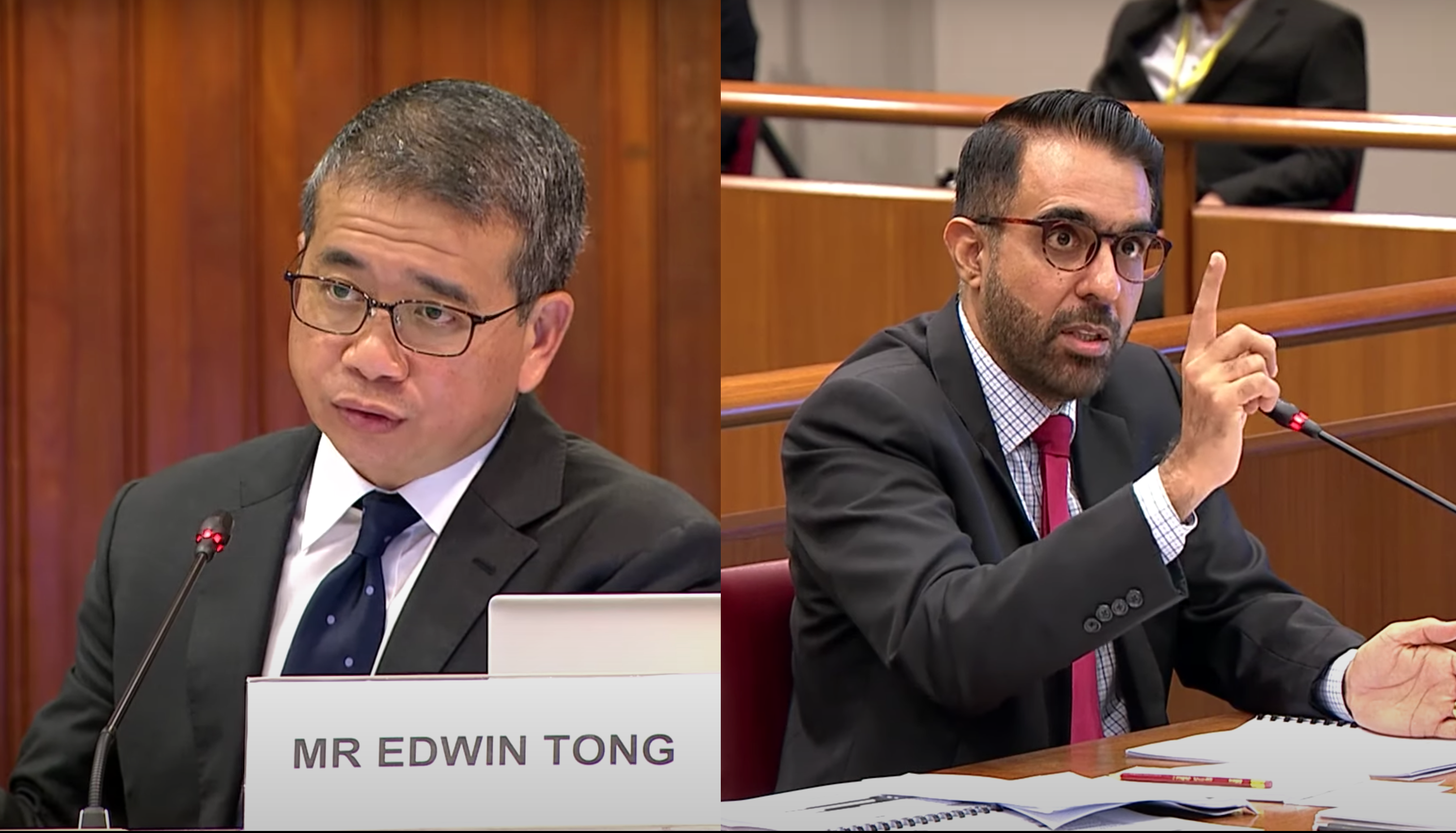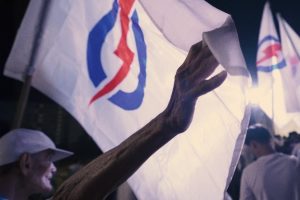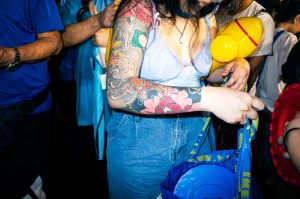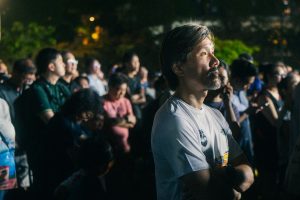All images by GovSG on YouTube, unless otherwise stated
In the Dec 10 instalment of an ongoing saga brought about by the lie told by former Workers’ Party MP Raeesah Khan, Leader of the Opposition Pritam Singh crossed swords with Minister for Culture, Community and Youth Edwin Tong during a nine-hour long hearing before the Committee of Privileges.
Apart from Edwin Tong, other committee members for this inquiry include its chairperson Tan Chuan-Jin, Ministers Grace Fu, Desmond Lee, MPs Zaqy Mohamad, Rahayu Mahzam, Don Wee, and the sole WP MP Dennis Tan.
ADVERTISEMENT
At the start of the entire proceedings, while questioning Raeesah Khan, Low Pei Ying, and Yudhishthra Nathan, Edwin Tong’s line of questioning was incisive and respectful. Subsequently, however, some, such as visual artist Sonny Liew, felt that Tong was trying to press Singh to fit into a politically convenient narrative—his own—rather than to embark on the “fact-finding mission” Tong termed it to be.
Similarly, Singh also made some compelling arguments although there were assertions he put forth which raised more questions than answers. Others, I found illogical and went against what the WP usually espouses.
Pritam Singh
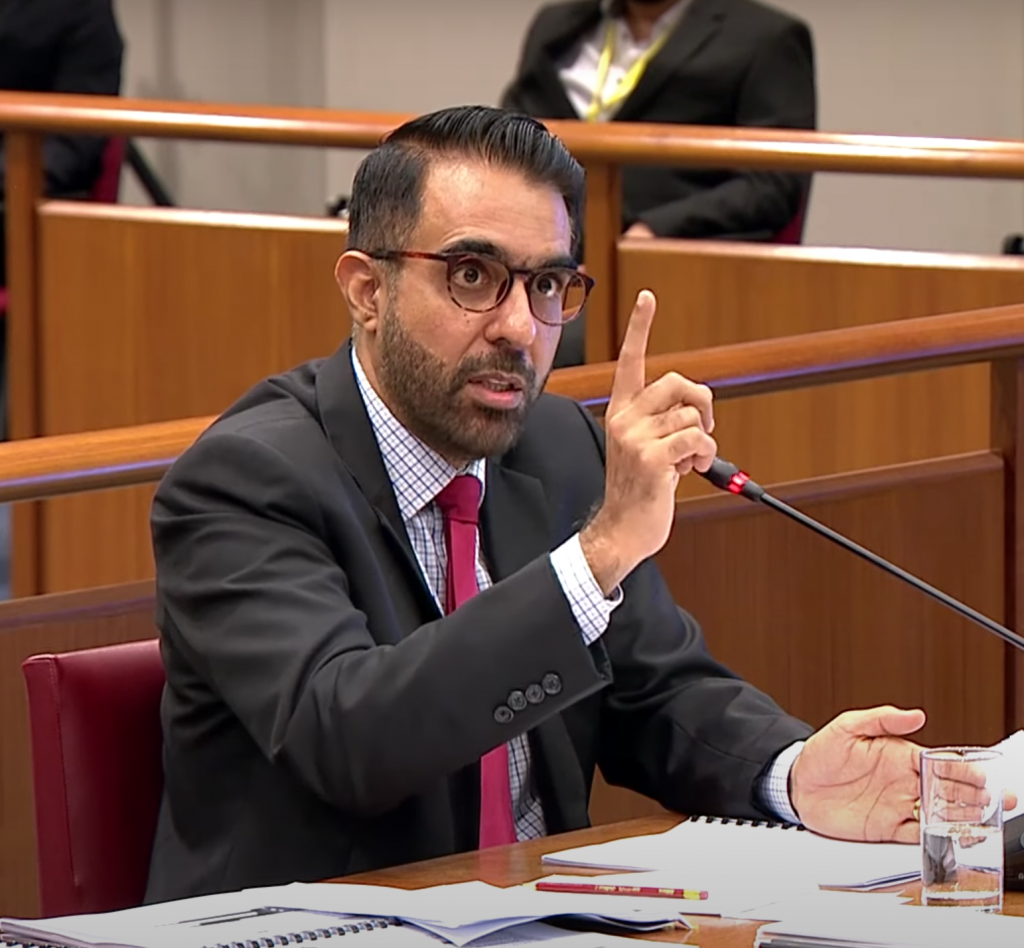
1. Raeesah suffers from dissociation
“I know something which she revealed to the Workers’ Party disciplinary panel on Nov 29, which is quite telling to me. She told the panel that she suffers from dissociation. Now, it was the first time I heard of it. I asked her what dissociation was. She said ‘It’s when I talk without thinking’. I asked her, ‘Don’t you think that’s dangerous for an MP?’ And she said yes.”
There appears to be an attempt by Singh to use her alleged mental health condition as the last trump card to reduce WP’s fallout in this saga when he suggested for the committee to call for a psychiatric evaluation on Raeesah. Minister Edwin Tong seemed to have sniffed out Singh’s attempt to put the cart before the horse, calling such a suggestion “inappropriate”.
Logically speaking, since Singh had known about her condition last month, he should have called for an assessment then, and not now at the committee hearing. By suggesting this now, it’s possible that Singh is driving home the point that Raeesah’s testimony at the hearing was unreliable and that the committee should not take that into consideration—if her condition is well-proven. It would also help Singh to exonerate himself and the party if he casts such an aspersion on Raeesah, further distancing him and the WP away from her.
ADVERTISEMENT
2. Police not negatively impacted by Raeesah’s lie
Edwin Tong: “That anecdote is false. It paints a picture of the police. That anecdote, if true, if left uncorrected, would have an adverse impact on the work of the police, correct?”
Pritam Singh: “In the context of what was said in Parliament, my answer remains no … I believe the police is not a broken-back organisation.”
Edwin: “You apologised (to the police) because you felt that wrong was done to the police, correct?”
Singh: “No, I think time was wasted.”
Edwin: “Exactly! That’s wrong done to the police—time was wasted chasing the tails for three months!”
Singh: “I disagree because I’m not sure what work the police actually did. I remember Aug 3 when Minister of State Desmond Tan stood up. He said the police have no case of this nature.”
It’s disappointing for the Leader of the Opposition to say that he didn’t feel that a wrong had been done to the police by Raeesah’s untruthful allegations against the police.
For the police to state that there wasn’t any case as mentioned by Raeesah, it had to waste time and manpower to investigate before coming to that conclusion. It’s puzzling for Singh to disagree with Edwin Tong’s argument that time was wasted because he wasn’t sure what work the police did.
The police had just released a statement on Dec 13, saying that substantial resources were devoted to looking into the allegations. Its officers pored through records of visitors to police stations across Singapore since Jan 1, 2017, to identify Raeesah’s alleged visit. Two rounds of checks were conducted.
They also combed through more than 1,400 sexual assault and related cases from 2018 to this year, as well as related feedback received from the public in 2018.
The statement read: “The quantitative impact of such falsehoods is not just in terms of the man-hours lost. There were also delays in handling other matters and cases, with impact on members of the public—whose cases could have been handled faster had the time and resources not been wasted trying to investigate an incident which never happened.”
I wouldn’t disagree with Minister Edwin Tong’s inference, that police work might be adversely affected if Raeesah’s allegation was left unchecked.
Raeesah was casting aspersions on police officers and if left unsubstantiated, Singaporeans might grow distrustful of our law enforcement agency. This might even give ammunition for certain activists in society to call for “defund the police”—not impossible, since there is such a movement in America.
Even worse are when sexual assault victims might hesitate to approach the police for help if they feel that the police is not going to be helpful.
3. David vs Goliath
Edwin: “On Oct 3, on your evidence, the one I have just read to you, if we believe that, then in your mind when you left her home on Oct 3, you would have no doubt that through one of the methods, through either way, this issue will come out in Parliament the next day.”
ADVERTISEMENT
Singh: “What methods?”
Edwin: “The two methods are: Either someone asks Ms Khan a question, or if not, then she will stand up on her own…”
Singh: “No, no, no, no. Not the latter, not the latter, Mr Tong. It’s a clever try. Not the latter. I made it very clear in my evidence right from the beginning, which is why I said look at my evidence in total, you will realise what I have said earlier. And you’re trying to catch me in a gotcha moment in one question you put in there. I’m sorry, Mr Tong, you’re a good lawyer but I’m a good listener.”
Edwin: “You see, it’s important for both parliament and the public to know that Ms Khan had come to the senior leadership of the Workers’ Party, confessed to them fully, and worked out with them what would be the conditions that she would come to parliament to clarify the lie.”
Singh: “That may well be your view, but I don’t agree with it.”
Edwin: “What’s wrong with being open and transparent; honest, give all the information?”
Singh: “Sure, I agree with you … there’s nothing wrong with it. Why don’t you do the same when TraceTogether happened in late October? Why didn’t the Government just come out and tell the truth straight away, don’t wait for a parliamentary question?”
Edwin: “Yes, I thought you might say that.”
Singh: “It’s because it’s very relevant. This is a decision the Government made and a call the Government made. And this is the call I made.”
While I have reservations about Singh’s use of the mental health card in the hearing and his flippant comments about the police, I can’t help but applaud his wit in his exchanges with the committee.
In the first instance, Singh believed that the minister, through his line of questioning, was trying to lead him into admitting something which he didn’t state in his evidence. But he was sharp enough to catch that and pointed it out.
For the latter, Singh counter-argued the minister’s point on being open and transparent, by mentioning the TraceTogether kerfuffle earlier this year—a point raised ad-nauseam online by the anti-establishment crowd.
Edwin Tong did not return to address this point in the hearing, which is a pity because while TraceTogether wasn’t the topic of focus at the inquiry, a confident and firm rebuttal by him might convince Singaporeans that the government’s standing is still higher than the WP’s.
Both men knew that the tape recording of the hearing would eventually go public. It’s clear that the minister tried to assert power over the opposition leader—including attempts to instruct Singh not to interrupt him while at the same time interrupting Singh on many occasions—to show his authority as a former cross-examiner and cabinet minister.
But Singh was aware of this and didn’t succumb to the fierce line of questioning in front of a People’s Action Party-dominated panel. He knew he had to live up to his reputation as Leader of the Opposition and show a strong and unwavering front at the inquiry.
He did so by calling the Minister Tong’s bluff, knowing his materials thoroughly to argue eloquently and convincingly, and occasionally throwing in retorts and quips to effectively hold himself against his witch-hunters.
It was crucial for Singh to perform well at the hearing to retain support within the WP and its supporters. According to Yahoo News Singapore, some within the party were already unhappy with how the leaders handled the situation, with a party source anticipating more fallout in the weeks to come, since there have been volunteers who had withdrawn from grassroots activities since Raeesah confessed her lie.
ADVERTISEMENT
Edwin Tong
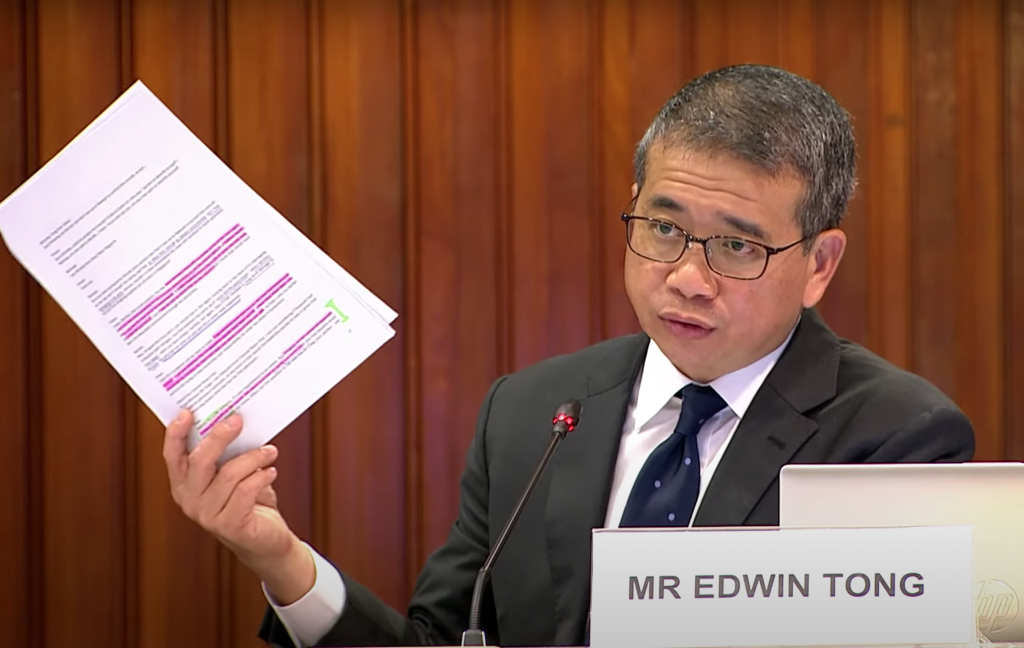
1. Sexual Assault vs Rape
Singh: “I used the word ‘rape’ earlier because this was the word Ms Raeesah Khan used when she described herself. But if chair(man) and the committee wants me to use the word ‘sexual assault’, I’m happy to use that word.”
Edwin: “I prefer not to go into any other details unless … (inaudible)”
Tan Chuan-Jin: “I’m quite happy if you use ‘sexual assault’ ”
When Raeesah first made her personal statement in Parliament to confess her lie from Aug 3, she said she is a survivor of sexual assault. But in narrating her experience to Singh, she used the word “rape”, according to new revelations by Singh.
It is worth noting that the gravity of rape and sexual assault as a broad term is different; sexual assault could generally mean molest, forced to watch pornography against one’s will, or having upskirt photos taken without consent—and rape.
At the WP press conference on Dec 2, Singh revealed that the party leadership had known about Raeesah’s lie as far back as August, but the rest of the country only knew about it almost three months later. Singh explained that the three months were to give Raeesah enough time to talk to her family about it. Many Singaporeans, including those in the committee, have questioned Singh’s judgment to do so.
ADVERTISEMENT
Would the three months make more sense to the rest of us who are watching this saga unfold, if Raeesah had used “rape” instead of “sexual assault” from the onset? Would it have changed the way we looked at these three months?
2. “I’ve got no agenda”
“I’ll be very upfront with you and tell you that I have got no agenda, except to ask questions that work out what the facts are. And there is nothing implicit in my questions.”
While the minister has said that there is no agenda, I’m not sure if his reassurances are reflected on the ground.
Political pundits like Andrew Loh have questioned why the committee had questioned the WP leaders much longer than the woman of the hour, Raeesah Khan, herself. Singh, for example, was questioned for nine hours while Raeesah only sat through two hours’ worth of hearing.
Others, such as veteran journalist Bertha Henson, felt that Edwin Tong’s line of questioning was attempting to get Singh to answer in a manner that conveniently fits into what he thinks should have been done rather than a neutral fact-finding exercise.
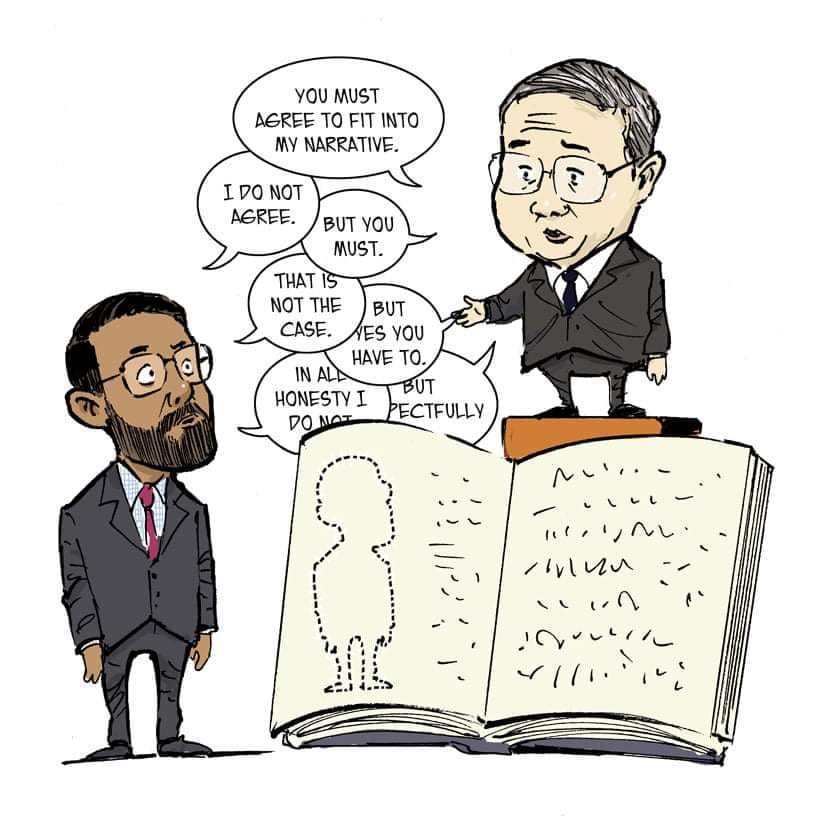
Given the line of questioning and how the hearings were conducted, they wonder if the committee was there to investigate the now-ousted MP and her lies, or using the platform of a Committee of Privileges as a political vendetta to put the WP leaders to task.
Questions have also been raised on the comments function on the GovSG Youtube channel which was disabled for the recording of Singh’s and WP vice-chairperson Faisal Manap’s testimonies, while the same was allowed on the videos for Raeesah.
3. The tone of the Committee of Privileges inquiry
Edwin: “Come on, don’t play with words, okay?”
Singh: “You are not going to put words into my mouth”
Edwin: “What is so difficult?” (after he pressed Singh a few times on the personal statement Raeesah Khan made)
Edwin: “Let me finish … let me finish … let me finish … MR SINGH, let me finish.”
These were moments during the hearing which raised the temperature in the room by a few notches. While this whole affair may seem to be a Workers’ Party problem, it’s also not an easy time for the ruling PAP government.
Other than the MPs on the committee, no other PAP politicians have yet to publicly comment on the issue. There appears to be a collective party attempt to steer clear of it for now. It’s possibly the right thing to do because it won’t do them good if they are seen as attempting to score political points now.
In fact, one could even argue that the pressure for PAP to handle this issue is high since its MPs are on the committee. They have to be seen as impartial, transparent, and extremely fair.
For example, even though the hearing was done behind closed doors, the reports and tape recordings were released publicly—although not without controversy over its timing.
But there has already been online chatter that Edwin Tong was more adversarial towards Singh than he should have been. Some also wondered about the line of questioning Edwin Tong took, claiming that questions he asked were leading.
If the PAP wants to emerge from this affair gaining more public support, its MPs in the committee must ensure the deliberations are fair. Political point-scoring by undermining the WP might make the PAP win the battle, but lose the war in the hearts and minds of Singaporeans.

